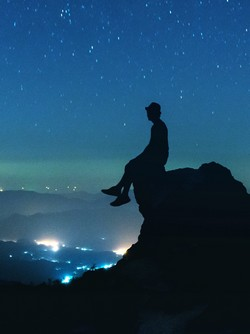Vivre éternellement, rêve sans fin,
Dans l'immortalité, nous cherchons notre destin.
Le temps, implacable, nous emporte dans la danse,
Mais dans l'éternité, nous trouvons l'espérance.
À chaque instant, un trésor caché,
Dans le voyage de la vie, notre destin est tissé.
Dans le cœur de ceux que nous aimons, notre nom résonnera,
Et ainsi, pour toujours, notre mémoire brillera.
Les étoiles dans le ciel, témoins silencieux,
Du désir humain d'être persistant, vertueux.
Dans l'immensité de l'univers, nous sommes poussière et lumière,
Mais nos histoires, nos âmes, sont intrinsèques à la lumière.
Vivre éternellement, c'est peut-être un rêve,
Mais laisser un héritage est ce qui compte, que l'on s'élève.
Nos actions, nos amours, notre art,
Sont la flamme qui réchauffe, qui fait de la vie une part.
Alors, nous vivrons à travers les histoires que nous racontons,
Dans les chansons que nous chantons, dans les amours que nous éprouvons.
Dans la beauté que nous créons, dans la compassion que nous donnons,
À travers chaque acte de bonté, à travers chaque horizon.
Vivre éternellement peut être une chimère,
Mais laisser une empreinte, être mémorable, est notre lumière.
Dans la mémoire des autres, nous trouvons notre foyer,
Et ainsi, nous vivrons éternellement, dans chaque cœur touché.

